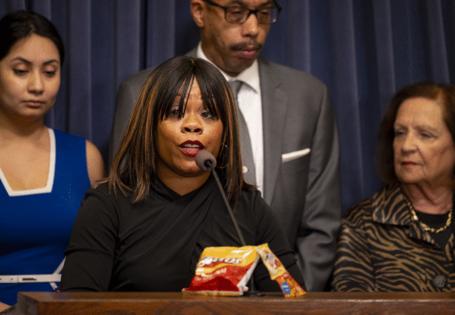Illinois hemp businesses owners call for regulation and taxation, not prohibition
Published in News & Features
The last thing most business owners want is to be taxed and regulated, but hemp business owners are asking for just that — as a way to keep their industry alive.
Hemp entrepreneurs came out Tuesday in favor of a state legislative proposal to license hemp sales, require testing and labeling of their products, prohibit products that look like well-known snack brands, and limit sales to those 21 and over. The bill would create 10% wholesale and a 10% retail sales taxes, and an unlimited number of $500 licenses.
That proposal stands in contrast with a bill backed by the Cannabis Business Association of Illinois, which would prohibit sales of hemp-derived intoxicating products.
Jennifer Weiss, founder and CEO of Cubbington’s Cabinet in Chicago, which sells hemp products, fears that the opposing bill would set such strict limits that it would even prevent sales of non-intoxicating products such as CBD.
“We would have to shut our doors, as well as hundreds of other Illinois companies,” she said. “Let’s not go backward with out-of-touch prohibitions.”
Potentially at stake is the future direction of the cannabis industry in Illinois. Currently, a split between state and federal law has created a stark contrast between the marijuana and hemp industries.
Both marijuana and hemp are grown from the same cannabis plant. State law has legalized marijuana, which gets users high through a component called delta-9-THC. Marijuana remains illegal federally. In 2018, Congress legalized hemp, which is defined as cannabis having less than .3% delta-9-THC, and so was meant to allow sales of non-intoxicating products like CBD.
But hemp processors figured out how to synthetically derive other intoxicating cannabinoids from the plant, such as delta-8 or delta-10, or even delta-9-THC. The CDC issued a health advisory in 2021 warning of adverse events involving consumption and insufficient labelling of delta-8, similar to delta-9 intoxication.
State weed licenses remain very limited and expensive, and are subject to strict testing and labeling requirements, meant to ensure their purity and potency. In contrast, unlicensed hemp is being sold in vape shops, corner stores and gas stations across the country, with no age or other restrictions.
As a result, sales of hemp products have exploded into a $28 billion industry, even larger than the legal cannabis market, by one estimate. The recent move by federal regulators to relax restrictions on cannabis would not likely affect the hemp THC conundrum. As a result, some licensed cannabis businesses have even resorted to selling hemp-based products.
...continued
©2024 Chicago Tribune. Visit at chicagotribune.com. Distributed by Tribune Content Agency, LLC.







Comments